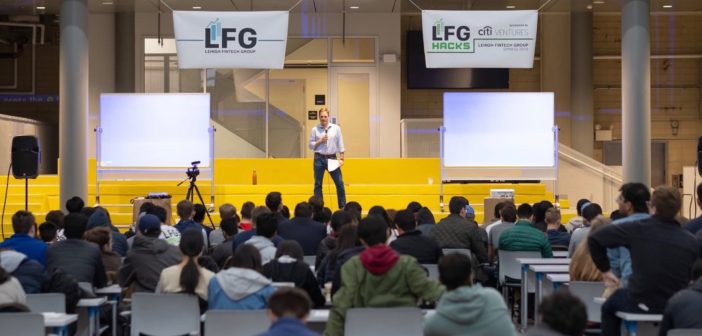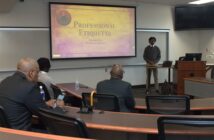Acknowledging the disruption of technology in financial services, from innovative crowdfunding Kickstarter to revolutionary payment processing Bitcoin, Dean Zimberg, ’20, founded the Lehigh FinTech Group (LFG). The group is a liaison between Lehigh students, faculty and the world of fintech.
“Within the fintech industry, much like the name suggests, it’s both finance and technology,” Zimberg said. “It’s both Wall Street and Silicon Valley coming together.”
Capitalizing on the success of Lehigh students at University of Pennsylvania’s Wharton Undergraduate Fintech Hacks 2018, where two Lehigh teams took home first place, LFG hosted Lehigh’s inaugural fintech hackathon. The event titled “LFGhacks 2019, sponsored by Citi Ventures” took place from March 22-24. In addition to Lehigh students, participants hailed from various universities, including the University of Pennsylvania, New York University and Columbia University.
Spanning over one of the high bays of Building C, rows after rows of white boards separated teams of two to four members, who were all competing for over $12,000 in prizes. Over a period of 36 hours, teams were asked to solve challenges from one of three prompts relating to data analytics by Citi Ventures, the global venture capital arm of Citi. Mentors from both the engineering and business sectors of Citi were available at the event. LFGhacks had about $31,000 in sponsorship from the venture capital.
According to a post onTradingTop.it, as much as the LFGhacks appears to be an archetypal hackathon with participants typing away on their laptops, rehearsing their concepts on white boards and pitch black coding screens, the underlying assignment is to get them to think about how interactive their final products might be in real-world inquiries. Activities throughout the hackathon allowed participants to relax and get to know each other.
Despite being a competition, LFGhacks also discerns to be a playground in which participants can experiment with the idea of fintech and learn from constructive criticism coming from business executives at Citi.
“(The hackathon) is more of a problem-solving (event) than just coding,” said Srini Laliwala, ’20.
Students were required to create a case-style presentation, with the option of a functional prototype. The goal was to practice real-world settings where communication of an idea or product is necessary. By the end of the 36-hour period, the six teams who placed presented their projects to all participants.
Having a tech edge, College of Engineering students Evan Hruskar, ’21, Sam Ruhe, ’20, John Kusner, ’20, and Laliwala, undertook the first prompt and subsequently received first place for Life Layer. Performing the function of a smart translator, Life Layer manages and queries a user’s digital identity securely and privately.
“Usually in a hackathon, you just build something cool, and whoever builds the coolest thing wins,” said Kusner, a computer science major. “In this one, you need to have some sort of profitability. You have to have more to your ideas basically.”
Many business-oriented teams had a concept and only knew a bit of coding, Laliwala said, but some of these teams placed because of their innovative solution.
Having that business module, Hruskar said, the hackathon became much more inclusive to the student body at Lehigh.
The start and impact of LFG
Embedded in LFG’s founding framework is Zimberg’s belief that true fintech innovation stems from the concept of “diversity of thought,” which employs both of Lehigh’s technical and business-oriented strengths. The amalgamation makes it optimal for allowing students of any major or experience level, said vice president of LFG, Cyrus Johannes, ’20.
By extension, the group sets its sights on creating a space that connects students with fintech opportunities beyond the pedagogical margins and essentially gives them a competitive edge when entering this up-and-coming workforce.
“The idea is to mimic the industry, and the industry is not just engineers, there is also business people,” Zimberg said. “You can think of LFG as the IBE program transcending onto a club. It’s everyone’s chance to be a part of IBE in a way.”
Beyond Lehigh, fintech has the power to revolutionize the financial services sector, Zimberg said. However, he said much of it is, to a great degree, outspread and obscure, especially for students who are just stepping their feet into the industry. The challenge for LFG hinges on encapsulating the applications of fintech and abridging it for students.
Since its start in 2017, LFG has been striding toward the goal of giving students a competitive edge with the operation of three core functions: workshops or info sessions, sponsored events and for-credit projects. The group has seen over 1,000 students participate in their events.
“If you think about it realistically, 99 percent of clubs at Lehigh are like ‘4 p.m. Come to the Rauch Business Center and eat pizzas,”’ Zimberg said. “But to me, that is not enough. For my group, I want to push the envelope.”
The fintech minor at Lehigh was developed after the creation of LFG, Zimberg said, and partly because the business school acknowledged the impact of the group. The corresponding curriculum, however, is a hodgepodge of finance and business information systems classes, he said.
The fintech minor includes a capstone project, an integrated engineering and business course devised by Kathleen Hanley and Catherine Ridings, co-directors of the fintech minor. Although creating opportunities for Lehigh students to explore the intersection between finance and technology have always been the pivotal objective of projects in the same vein, many of their implementations lack practicality.
“Even though they were professors, they were just professors talking to professors,” Zimberg said. “They were not professors talking to students who were talking to American Express or Citi Ventures.”
For that reason, LFG’s project is cross-listed with the Capstone project through the registrar under FIN 372, a course of special topics that requires students to deal with analytics coming from operational patrons and solve real-world problems. This semester’s FIN 372 course was sponsored by Citi Ventures and included the hackathon.
Aside from declaring the fintech minor in the business school, students who are interested but don’t have the capacity and time can enroll in these projects by signing up through LFG.
The class is atypical because there are no exams and is graded on collaboration and each student’s added value. Zimberg envisioned FIN 372 to be a domain in which students who can incubate a project over the course of a semester.
“We create the curriculum,” Zimberg said. “It’s a curriculum by students, for students.”






Comment policy
Comments posted to The Brown and White website are reviewed by a moderator before being approved. Incendiary speech or harassing language, including comments targeted at individuals, may be deemed unacceptable and not published. Spam and other soliciting will also be declined.
The Brown and White also reserves the right to not publish entirely anonymous comments.